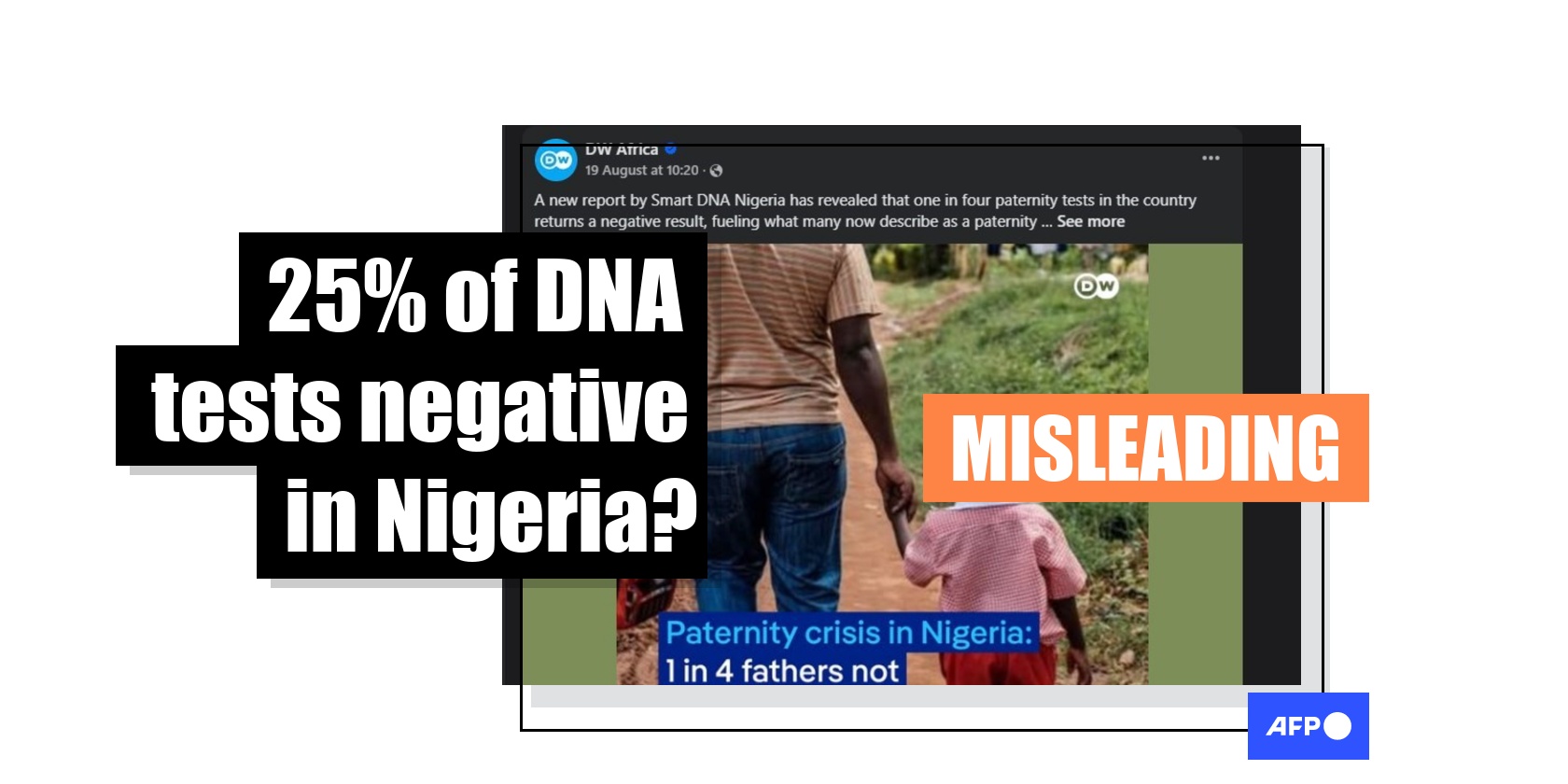
Claim that 25 percent of Nigerian men are not biological parents of their children is misleading
- Published on August 28, 2025 at 16:14
- 3 min read
- By Oluseyi AWOJULUGBE, AFP Nigeria
“Paternity crisis in Nigeria: 1 in 4 fathers not biological parents,” reads the text in a graphic published on Facebook by the Africa service of German broadcaster Deutsche Welle on August 19, 2025.
The accompanying caption in the post, shared more than 1,000 times, cites the source of the data as the 2025 Annual DNA Testing Report published by Smart DNA Nigeria, a medical clinic based in Lagos, Nigeria’s commercial capital. The survey lists at least nine other states where the clinic receives clients from.

The claim has been widely circulated on X, Instagram and in news reports.
However, the data has been misinterpreted.
Skewed survey
In its report, Smart DNA Nigeria boasts of providing the “most comprehensive analysis of paternity and relationship testing trends in Nigeria” and does not immediately dispel the idea that its sampling represents nationwide trends (archived here).
“As the leading DNA testing center in the country, we continue to provide accurate, confidential, and insightful data that helps families, policymakers, and researchers understand the evolving dynamics of paternity in Nigeria (sic),” the report adds, before listing its five key findings together with graphs and comparisons with the previous year, as well as recommendations for policymakers and legislators.
According to the report, the survey results were based on “important insights” from July 2024 to June 2025.
The first key finding, which was amplified on social media as a national crisis, reads: “1 in 4 paternity tests returned a negative result, meaning the tested man was not the biological father.”
This marked a “notable” decrease from the previous year, although the clinic declined to tell AFP Fact Check what sample size it used, citing client privacy.
A disclaimer found at the bottom of the report states: “Our client base is not representative of the general Nigerian population, and our negative result rates should not be extrapolated to suggest widespread paternity issues across all Nigerian families.”
Femi Adebola, a professor of sample survey statistics at the Ondo-based Federal University of Technology in Akure, told AFP Fact Check that interpreting the results from a single clinic and applying them to the Nigerian population would not be factually accurate.
“The result of such a dataset will be skewed to the location where that clinic is based because its clients would be drawn from nearby. Also, it is possible that a majority of those who conduct such tests already doubt the paternity of their children, thereby influencing the results,” he said.
“A nationally representative survey would draw participants randomly and have a sample size that can be extrapolated to Nigeria’s total population, and this is determined by statistical formulas,” Adebola added.
The clinic lists two addresses in Lagos, but conducts paternity tests for clients in other states.
Phillips Ekpe, an obstetrician and gynaecologist at the Kubwa General Hospital in Nigeria’s capital city Abuja, urged a cautious approach to the survey’s findings, saying on national television that the statistics from Smart DNA Nigeria only apply to households where the paternity of children is in dispute.
“For us to have adequate statistics, you need to test every child born in Nigeria, without any suspicion and take a DNA test and match with their father,” Ekpe, who was the former general secretary of the Nigerian Medical Association, told local broadcaster Arise News on August 23, 2025.
“What that data represents is one in every four children whose paternity are suspicious; there are millions of couples who do not have suspicions. So if you test a million couples, you may be shocked the results would be one in 10,000 or one in 100,000. Those statistics apply to a minute subset of Nigerian households, it does not apply to the entire population.”
Copyright © AFP 2017-2026. Any commercial use of this content requires a subscription. Click here to find out more.
Is there content that you would like AFP to fact-check? Get in touch.
Contact us
